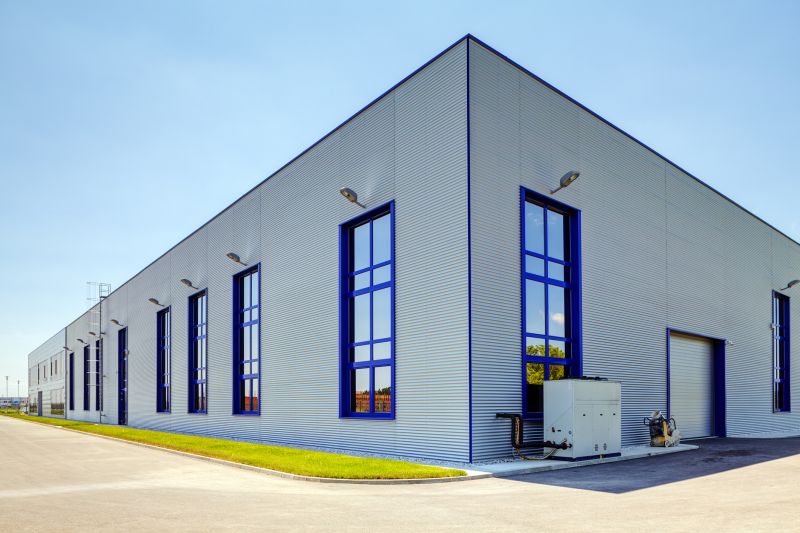Top-Rated Commercial Siding Products for Professional Installers
A curated selection of siding materials and tools that help contractors achieve superior quality in commercial siding projects.
 Commercial siding installation is a critical aspect of building exterior maintenance and enhancement, requiring a wide range of products tailored to different building types and project specifications. The selection of appropriate materials and tools can influence the durability, appearance, and overall performance of the siding. From foundational components like sheathing and underlayment to finishing elements such as trim and sealants, the variety of products available ensures that contractors and property managers can find solutions suited to their specific needs. Proper installation not only improves the aesthetic appeal but also contributes to the longevity and weather resistance of the building envelope.
Commercial siding installation is a critical aspect of building exterior maintenance and enhancement, requiring a wide range of products tailored to different building types and project specifications. The selection of appropriate materials and tools can influence the durability, appearance, and overall performance of the siding. From foundational components like sheathing and underlayment to finishing elements such as trim and sealants, the variety of products available ensures that contractors and property managers can find solutions suited to their specific needs. Proper installation not only improves the aesthetic appeal but also contributes to the longevity and weather resistance of the building envelope.
Top Overall Option
Premium Siding Panel System
A versatile and durable siding panel system designed for commercial applications, offering a range of finishes and installation options. It provides a solid foundation for various siding types, ensuring compatibility, ease of installation, and long-term performance. Its modular design allows for efficient installation and maintenance, making it a preferred choice for many contractors seeking reliable and adaptable siding solutions.
Types of Products For Commercial Siding Installations
Fiber Cement Siding
A popular choice for durability and low maintenance, available in various textures and colors to suit different architectural styles.
Metal Siding Panels
Known for their strength and weather resistance, these panels are suitable for a range of commercial buildings.
Vinyl Siding
A lightweight and cost-effective option, offering a variety of styles and colors with straightforward installation.
Wood Siding
Provides a natural aesthetic and can be customized with stains or paints, though requiring more maintenance.
Aluminum Siding
Resistant to rust and corrosion, suitable for various climates and easy to maintain.
EIFS (Exterior Insulation and Finish System)
A layered system offering insulation and a finished surface, ideal for energy efficiency and seamless appearance.
Composite Siding
Made from a blend of materials for enhanced durability, often mimicking natural wood or stone.
Stone Veneer
Provides a natural stone look with easier installation compared to full stone cladding.
Brick Veneer
Offers the aesthetic of traditional brick with lighter weight and simplified installation.
Insulated Siding Panels
Combines siding with insulation layers for improved thermal performance and energy efficiency.
Rubber Siding
Flexible and impact-resistant, suitable for specialized architectural features or protective applications.
Panel Fasteners and Clips
Essential for securing siding panels, available in corrosion-resistant options for different materials.
Sealants and Caulks
Used to seal joints and edges, preventing water infiltration and enhancing weather resistance.
Underlayment Materials
Provide a moisture barrier underneath siding, contributing to overall building protection.
Siding Trim and Molding
Finish and accentuate the edges and corners, adding aesthetic appeal and protection.
Popular Choices
Widely used for its durability and low maintenance, available in multiple textures and colors.
A favored option for affordability and ease of installation, with a broad selection of styles.
Popular for their strength and weather resistance, suitable for various commercial applications.
Growing in popularity for thermal insulation and energy savings benefits.
Chosen for its corrosion resistance and low maintenance requirements.
Provides a natural stone appearance with easier installation compared to traditional stone cladding.
Offers a classic brick look with lighter weight and simplified installation process.
Versatile and durable, often chosen for its ability to mimic natural materials.
Essential hardware for secure attachment of siding panels, available in corrosion-resistant variants.
Important for sealing joints and preventing water ingress, available in various formulations.
Used beneath siding to provide moisture barriers and improve overall building protection.
Completes the installation with finishing touches around edges and corners.
In addition to the primary siding materials, accessories such as fasteners, adhesives, and specialized tools play a vital role in ensuring a secure and seamless installation process. The choice of products can depend on factors like building size, environmental exposure, and the type of siding material used. For instance, some projects may require corrosion-resistant fasteners for coastal locations or high-performance sealants for areas prone to heavy rainfall. Understanding the range of available products and their applications helps in planning and executing a successful siding project.
Commercial siding projects often demand products that are easy to handle, compatible with various building codes, and capable of providing long-term performance. Contractors should consider the ease of installation, product lifespan, and maintenance requirements when selecting materials. Properly chosen products can facilitate smoother workflows and contribute to the overall quality of the finished project. Whether upgrading an existing building or constructing a new commercial property, the right selection of siding products is essential for achieving desired results and ensuring customer satisfaction.
Key Buying Considerations
- Material durability and suitability for specific environmental conditions
- Compatibility with existing building structures and materials
- Ease of installation and availability of installation accessories
- Maintenance requirements and long-term upkeep
- Aesthetic options including textures, colors, and finishes
- Compliance with local building codes and regulations
- Resistance to moisture, pests, and corrosion
- Thermal insulation properties and energy efficiency
- Weight and handling considerations for ease of transport and installation
- Availability of warranty or support from suppliers
- Cost-effectiveness over the lifespan of the siding
- Compatibility with other exterior systems such as trim and sealants
- Environmental resistance such as UV stability and weatherproofing
- Flexibility for future modifications or repairs
- Supplier reputation and product reviews
